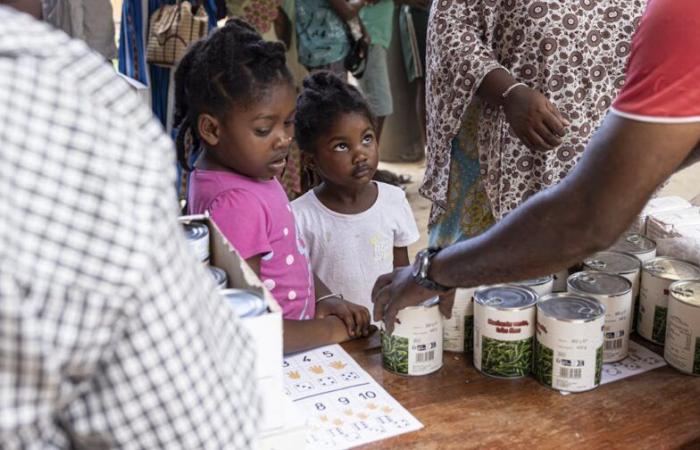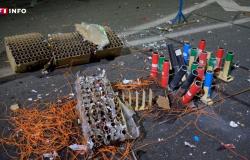Marc Dubois, researcher in economic sciences at the University of Mayotte, experienced Cyclone Chido on site on December 14. In the following days, he was able to see the queues follow one another in Mamoudzou, Dembéni or Kawéni. He provides us with an analysis of the underlying reasons for these shortages of water, fuel and food, which implacably awaken the ghosts of the inequalities of the seahorse island.
When a young man from the Department of Environment, Development and Housing (DEAL) came to present the various risks facing Mayotte last year, the audience listened with half-hearted attention. Among these risks, there was of course the cyclone risk. “We didn’t expect that. » This observation by most residents in December 2024 implies that they had, subjectively, reduced the probability of the occurrence of a devastated territory.
Read more: Mayotte: meteorological cyclone and social cyclone
At the moment of the cyclonic passage, there is a risk linked to survival, to the material condition of real estate and vehicles. Only a few minutes after the lull, the men from the slums, without any planning, rushed on the scattered metal sheets. The still usable nails, screws and other bolts were carefully packed as they hammered to straighten the twisted sheets. Twenty-four hours later on average, a significant portion of the “bangas” (sheet metal huts) were rebuilt, even more fragile than the day before.
Line of empty cars
Is the passage of the cyclone a risky event? It would rather be a multi-risk event. The cyclone brought down the overwhelming majority of fruit trees. A few minutes after its passage, in the villages, the poorest women and miners entered the land now without fences to collect papayas, mangoes, bananas and other stranded fruits. At the same time, the “wazoungous” (white women and men) were looking for a network to call their loved ones. A cyclone almost inevitably leads to a power and telecommunications outage in all homes. Without electricity and fruit trees, other risks arise, these risks are linked to the accessibility of basic necessities.
A week after the passage of the cyclone, six o'clock in the morning, north of Mamoudzou, a line of empty cars is installed for hundreds of meters biting the road from Kawéni to the gas station, closed. Their occupants probably waited for hours the day before, but did not obtain the fuel they had hoped for. At the same time, in Hajangoua, a remote place in the commune of Dembéni, a lady in her fifties, without a husband but with four dependents, finally gathered her modest means to rebuild the fallen sheet metal fences. since Saturday the 14th. His face betrays his malnutrition. What do each occupant of the vehicles left in Kawéni and this lady have in common? For many days, they have been facing market shortages in a territory of 374 square kilometers which operates in a closed economy.
Haro on anti-competitive behavior
Remarkably since the hurricane, all markets for basic necessities and other normal goods are in shortage; the quantities offered are (significantly) lower than the quantities demanded. The currency market itself is in shortage.
Subscribe today!
Whether you are managers looking for strategies or employees wondering about the choices of their hierarchy, receive our thematic newsletter “Company(s)”: the keys to research for professional life and advice from our experts.
The anti-competitive behavior of unscrupulous suppliers is no longer even disguised. After delivery of around twenty gas bottles, a seller from Mtsapéré refused to sell them to the attentive seekers who were already forming a queue in front of his modest stall. It was only after being threatened with a fine for anti-competitive behavior that the seller changed his mind. Furious because his pride was wounded, he acceded to the request of consumers who were desperate at the idea of not being able to cook their daily food.
When the distribution of bottled water began in the Mamoudzou neighborhoods, the quantity offered was significantly lower than demand. Also, during the distribution of the last bottles, the applicants violently tried to glean a little water. At the same time, the neighboring grocers had already returned to their businesses and had already prominently placed on the shelves the same packs of water that had been distributed to them for free a few minutes earlier.
1 pack of water per person, one bag of rice per person
Shortages are not an unprecedented state of markets in Mayotte. Well before the cyclone hit, every Mahorean consumer already regularly felt the dissatisfaction of not finding bottled water, flour or eggs in stores. These shortages are the result of several factors: inability of food importers to stock imported goods and shortages in the land market, which is anchored in everyone's mind as inevitable.
Read more: Mayotte: urbanization to rethink
Today, at the entrance to all supermarkets is written: “1 pack of water per person, one bag of rice per person, one carton of sardines per person”. Rationing is in place to prevent abusive consumer behavior in times of acute shortages.
Power of supermarkets and local grocery stores
The state has decided to intervene in the consumer goods and construction materials markets. As such, these markets are now regulated and prices “locked” at the levels observed before the hurricane. These regulations have the dual objective of proposing an equal allocation of basic necessities and stabilizing prices at a time when the time is ideal for speculative behavior.
Although taken urgently, this one-off solution responds to the older annoyance of the Mahorais who believe that the cost of living on the island is too high. Such measures had already been taken when drinking water was very scarce on the island. The stores with the largest sales areas scrupulously respected the regulations. However, due to a lack of sufficient controls, local grocery stores (essential for the part of the population that does not have access to transport) exercised their market power as if nothing had happened.






